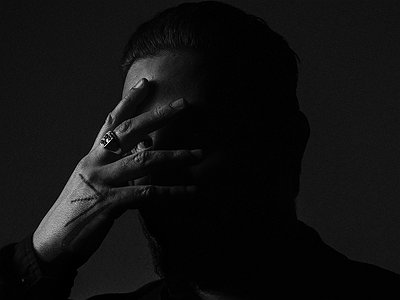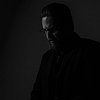Could you take us through a day in your life, from a possible morning routine through to your work? Do you have a fixed schedule? How do music and other aspects of your life feed back into each other - do you separate them or instead try to make them blend seamlessly?
I woke up at 7AM, fed my dog Sandy, made coffee, smoked a cigarette, and played guitar for about 30 minutes. I have not been actively writing during the pandemic. In January, I picked up a pen and began to draw and illustrate in my moleskine notebook. With a new album rolling out and the 7 songs on the back burner for the full band; I am patiently waiting and looking for new outlets. I have always said “I’m going to pick up visual art when I retire” the pandemic has felt almost like a retirement. Many of my drawings play into my writings. The images describing my lyrics, stories, and poems can be seen now for the first time. I am getting the same high with a completed drawing as I would with completing a new piece of music. It is a fantastic feeling.
Could you describe your creative process on the basis of a piece or album that's particularly dear to you, please? Where did the ideas come from, how were they transformed in your mind, what did you start with and how do you refine these beginnings into the finished work of art?
The turning point in creative output was with my old group Young Widows. The album is titled “In and Out of Youth and Lightness” and if listening to my music prior to this album it is clear that I found something that I had always been searching for. Which was my actual voice. This album had many themes and concepts. I had gone through a divorce and that deadly age of 27. It is my “coming of age” album. Musically, we wrote and explored endless hours. To the point where certain band members said that they never wanted to make an album in that manner ever again. Though the album’s lyrical theme there is also musical themes. Similar note arrangements performed at different tempos and arranged with different percussion or different instrumentation. It is still a concept that I would like to dip further into. To use the same notes throughout a body of work, but to disguise the notes to an almost unrecognizable sonic journey.
This concept was lifted from listening to Ennio Morricone scores. That is the beautiful thing about a film score; it is okay to return to a melody that was 40 minutes ago because it is a part of the journey that is similar. If the melody is grand enough, just use it again, but mix it up a bit.
There are many descriptions of the ideal state of mind for being creative. What is it like for you? What supports this ideal state of mind and what are distractions? Are there strategies to enter into this state more easily?
The best time to create is first thing in the morning. I like to try to create in my sleep. Attempting to control dreams and wake up firing. I attempt to steer away from current events and outside influence. I try to find a desert landscape in my mind and start to dig or build or just take a long walk. I will eventually break through that thick shell of a surface and hit creative gold. Gold to me is a sense of accomplishment and relief.
How is playing live and writing music in the studio connected? What do you achieve and draw from each experience personally? How do you see the relationship between improvisation and composition in this regard?
Whether in the studio or on the stage; the performance is all that matters. The performance could be majority rehearsed, or majority improvised and either way none of it matters unless performed to satisfactory. Pieces all begin with the spirit of improvisation and eventually become documented on a recording. For many that is the be all and end all of a piece. I have always attempted to let the experience of the song continue to grow. That may mean adding more instruments or shortening or lengthening sections. This doesn’t happen with every song and many times the songs that lose that free energy eventually drop off the set list and are rarely performed in a live setting.
How do you see the relationship between the 'sound' aspects of music and the 'composition' aspects? How do you work with sound and timbre to meet certain production ideas and in which way can certain sounds already take on compositional qualities?
Sound and composition go fist in hand. The sound is the first and moulded into fingers with bones, and flesh, and nails, and joints, once the sounds are there; the fist is held and blanketed by a more secure and gentle moving mould. The fist of sound is held at many angles.
Our sense of hearing shares intriguing connections to other senses. From your experience, what are some of the most inspiring overlaps between different senses - and what do they tell us about the way our senses work? What happens to sound at its outermost borders?
I have always been attracted to darker sounds. Almost creeping sounds. I relate this to the joy of fear. The adrenaline of that confusion and excitement. The thing with fear is; when one is patient and searches for the causes of fear eventually the fear evolves into relief. One’s sense of tension resolves.
Art can be a purpose in its own right, but it can also directly feed back into everyday life, take on a social and political role and lead to more engagement. Can you describe your approach to art and being an artist?
Art is education. While it is also a source of entertainment; I have always looked or listened or made art to share with a progressive culture. To challenge and educate the basic thought patterns and lifestyles of living beings. I would not be who I am without the artists that influenced me. I hope that I am doing the same for others. But that is not why I make art. I make art because art has always been part of my being.
It is remarkable, in a way, that we have arrived in the 21st century with the basic concept of music still intact. Do you have a vision of music, an idea of what music could be beyond its current form?
Music is in everything. Music is the sound of tires on a road, the communications of birds, the wind of an exhaust pipe, the swelling of a wood framed house, the crying of babies, the stomping of feet. Music will never be a basic concept.






